What won't be in the Queen's Speech?
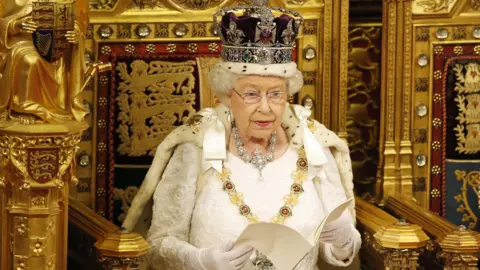 PA
PAThe Queen's Speech is that striking moment of parliamentary pageantry when the government sets out its legislative plans.
But some proposals - based on the winning party's manifesto after an election - could be in doubt with Prime Minister Theresa May's Commons majority wiped out.
One cabinet minister says elements of the Conservative manifesto will have to be "pruned away".
Even the speech itself could be delayed to allow for any changes as the ink takes days to dry on the goatskin parchment paper from which the Queen reads.
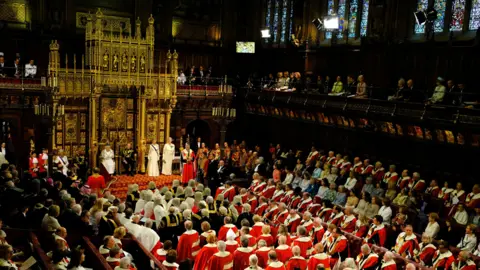 PA
PAThe party will now need the support of 10 MPs from the Democratic Unionist Party (DUP) to get bills passed.
Tory MPs still aggrieved over perceived mistakes during the election campaign have called for certain manifesto measures to be dropped.
However, they still want to be able to govern and as one backbencher told me: "We don't want to cause Theresa May any more problems than she has already caused herself".
So which parts of the manifesto might face ministers' shears?

Social care
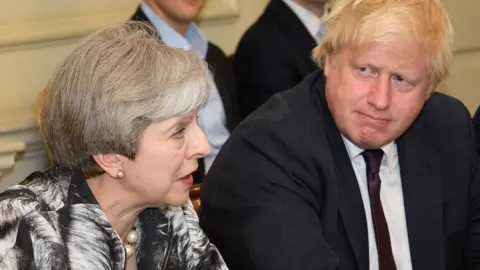 Getty Images
Getty ImagesThere seems little chance that specific pledges on social care will make it anywhere near the Queen's Speech in the precise form they appeared in the manifesto.
The plans - dubbed a "dementia tax" by critics - were for elderly people requiring care in their own homes to meet the cost - but they would be allowed to keep £100,000.
Theresa May said there would be an absolute limit on the amount people would have to pay but denied claims of a U-turn despite the manifesto not mentioning a cap.
The former chancellor George Osborne described "dismay" among Tory MPs that they were not consulted on the plans.
He said the promises on social care were among those which made the manifesto go down as "one of the most disastrous political documents in British history."
The plans could be replaced by a promise to launch a consultation on the future funding of social care.
That may include a policy proposal document - or White Paper - outlining various alternatives, according to the former Cabinet minister Sir Oliver Letwin, who has had a hand in writing previous party manifestos and Queen's Speeches.
He called for a "a mature debate outside the heat of a general election campaign" where MPs can look "calmly and carefully" at the options.

Grammar schools
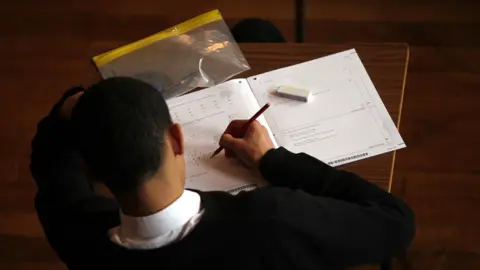 PA
PAReversing the ban on selective education in England was one of Theresa May's signature policy proposals - backed by her joint chief of staff Nick Timothy.
It features prominently in the Conservative manifesto, which claimed grammar schools almost completely eliminated the "attainment gap between rich and poor pupils".
But a number of Conservative MPs have been uneasy about the plans - with one telling me they are "now on the cards for not going forward".
It is among the policy areas that will come down to a calculation about simple parliamentary arithmetic says Tim Bale, professor of politics at Queen Mary University of London.
He said the Queen's Speech will inevitably "scrap anything that looks like it won't get absolute support".
Mr Timothy, who was sacked by the prime minister after the election, said he took responsibility for overseeing the policy programme during the campaign.

Pensions
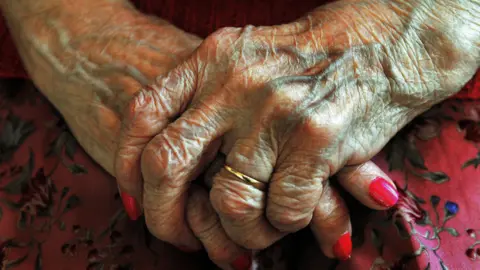 PA
PAThe Conservative manifesto proposed ditching the "triple lock", in which pensions are raised in line with the highest of average earnings, prices or 2.5%.
From 2020, the plan was to cut the 2.5% element, to leave a "double lock".
Some Tory MPs were concerned about way the plans were perceived by their elderly voter base, but others believe the double lock is still fair.
The delivery of pensions is one of a large number of areas of social policy that is devolved in Northern Ireland.
However this is where things get hard to predict, as there is a complicated parliamentary procedure to determine whether MPs from non-English seats can vote on such matters relating to England - and so Tory ministers might still want to take account of the DUP's views.
The DUP's 2017 manifesto for its Westminster seats in Northern Ireland said it "always advocated for the interests of older people".
The Tory proposal is "not in line" with DUP policy, according to Nelson McCausland, the party's former member for North Belfast in the Northern Ireland Assembly.
The DUP manifesto pledged to "support the maintenance of the pensions 'triple lock'."

Winter Fuel Payments
The Conservative manifesto announced plans to means-test winter fuel payments for pensioners in England and Wales.
It was another controversial pledge likely to meet resistance from some Conservative MPs - but again this is complicated by the fact that the benefits payment is a devolved issue.
The Scottish Conservative Party leader Ruth Davidson has said Scottish pensioners should continue to get the payments because the country is colder.
The SNP-led Scottish government had already said it would not introduce a means test in Scotland.
The DUP manifesto says the party is "proud" of the universal benefits introduced in Northern Ireland, saying it would "resist any assault" on winter fuel payments there.

Brexit plans?
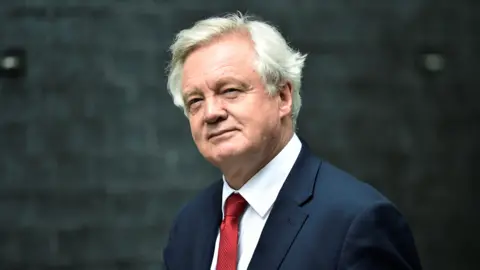 Reuters
ReutersA huge part of the government's legislative plan is the so-called Great Repeal Bill which aims to ensure European law will no longer apply in the UK.
The bill will ensure all existing EU legislation will be copied across into domestic UK law to ensure a smooth transition on the day after Brexit.
It is likely to be "one of the largest legislative projects ever undertaken in the UK", according to the House of Commons library.
Legally, this "has to happen" says Professor Bale.
"That will have to go in (the Queen's Speech) - I think everybody agrees that's absolutely necessary," he says.
But with no formal majority, there is renewed potential for tension within the party over Brexit plans - particularly over the precise arrangements for leaving the single market and the customs union.
There is now an important new constituent part of the Tory parliamentary party in Westminster - 13 Scottish Conservative MPs.
The Scottish Conservative leader Ruth Davidson has called for an "open Brexit" that keeps the "largest amount of access" to the single market.
Professor Bale believes the stripping down of other parts of the Queen's Speech "might not be a bad thing" because Brexit will be the dominant legislative issue.


